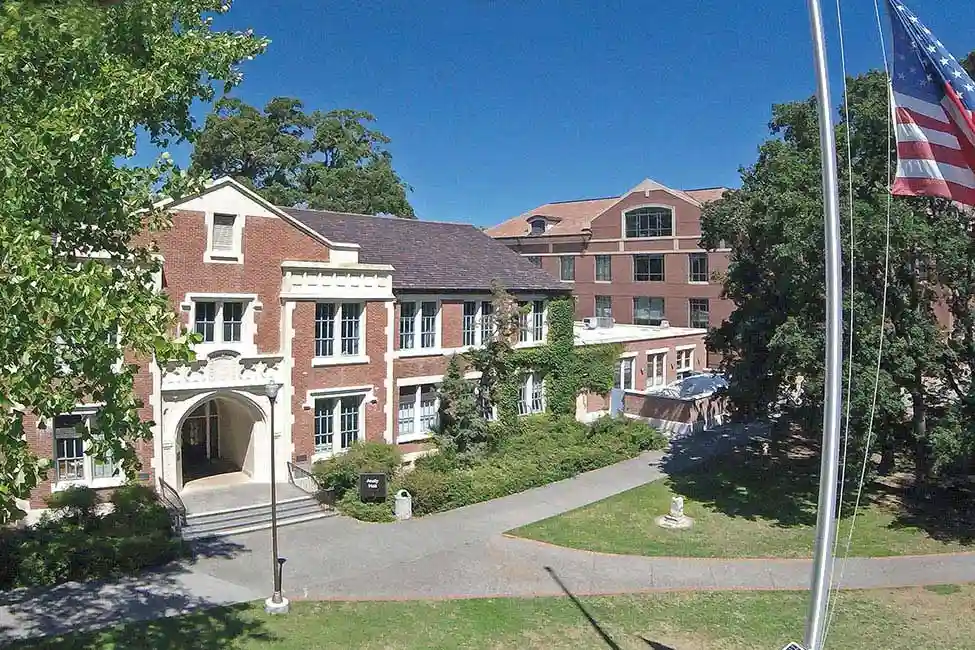Improving Your English for Success at a U.S. University

Find an English Language Program (ESL)
Brimming with textbooks, yesterday’s lecture notes and homework, over 885,000 international students sling their backpacks over their shoulders and join the crowds of students on American university and college campuses. While these international students have gained acceptance at both undergraduate and graduate programs around the United States, they may not be fully prepared to gain maximally from their studies.
Most international students have not studied in an American-style classroom, where the expectations for performance and daily behavior may differ significantly from academic settings they are used to. For example, in most universities it is common to call the professor by his or her first name and sit in a semi-circle to foster lively discussions. Students are expected to speak, respond to other students, ask questions, and explain their opinions in an informal fashion— all in English.
Without this exposure, international students find it hard to adjust to the expectations of an American academic setting. Foreign student may not actively participate as expected, making it difficult for their professors to appropriately assess their knowledge versus that of their U.S.- born peers.
Intensive English Programs (IEPs) significantly improve a non-English speaking student’s chances of academic success. This is why many international students who have already been accepted to the university of their choice spend a few months at a language program prior to beginning classes full-time. One student who chose to complete an English program in preparation for graduate study said, “In my particular case, one of the reasons why I selected NESE (The New England School of English) [is] that it prepares students for university.”
This student and many others know that the valuable speaking experience and cultural familiarity they gain living and studying here will prepare them to hit the ground running when they enter college or university in the US. Their transition to a degree program is smoother than those who haven’t had this preparation and students who have had this preparation tend to feel more comfortable in their new surroundings.
Intensive English Language Programs
Intensive English Program classes tend to be smaller, and most have classes with fewer than 15 students. This makes a critical difference in learning. You will feel more comfortable, which ultimately makes it easier for you to practice speaking English. Smaller classes also give teachers the opportunity and time to help you and other students speak more fluently and more accurately.
In these immersion programs, you will speak and listen in English even when reviewing grammar or learning how to cite research. This gives instructors numerous opportunities to provide accent training and help you polish your pronunciation. It is extremely important in order to be understood by future classmates and professors and this extra practice time prepares you for speaking clearly enough that others can understand and respond to you.
When speaking, you will be encouraged to do so in ways that come naturally to your U.S. classmates. University students need to be able to express original thoughts during a class discussion. Doing so helps you identify the particular distinctions between formal written English and spoken English and become comfortable switching from register to register.
Obviously, having academic success is very important; after all, that is why you are studying in the US. You will also be living in the USA. There are countless opportunities for friendships, new experiences and life lessons. English language schools also provide a foundation that can mean the difference between becoming fully immersed in your university’s culture, or simply remaining with other students of the same nationality or language background.
By focusing on the speaking and listening skills necessary for negotiating the various aspects of daily life in the USA, you become less afraid of making mistakes and more willing to speak with people outside your classes. As English becomes easier for you to use, you will become more confident using it in a variety of settings: the language classroom, restaurants, doctor’s offices, and on public transportation.
Intensive English programs provide a welcome bridge and serve to make your transition into a university easier and more enjoyable. When you enter your degree-awarding program, you will feel more at ease in the first days and weeks when you will also be adjusting to a new program, new academic demands and new friends. Former New England School of English (NESE) student and current PhD candidate at the University of Michigan: “Classes are fun because they are adapted to students’ needs. We debated a lot, laughed a lot and learned a lot.”
With a solid foundation in English you will enjoy your university classes more, improve your chances of academic success and have a greater ease in making friends.
The New England School of English
The New England School of English (NESE) is located in Harvard Square, adjacent to Harvard University, in Cambridge, Massachusetts. At NESE, students from over 50 countries learn English and are exposed to American language and culture. With intensive English language training and complete cultural immersion, students maximize language learning.
The intensive curriculum is also specially designed to help students achieve their academic goals. In addition, a TOEFL ® Preparation course, the Institutional TOEFL® exam each month, and a University Preparation course are offered.
Also available are extensive educational counseling and a university placement service, a university resource library to help students plan future studies in the United States, and admission into a wide range of universities without taking TOEFL®.
In their spare time, students enjoy the rich culture that Harvard Square offers as one of the most interesting and dynamic student centers in the United States. “The Square” is filled with cafes, restaurants, bookshops, and boutiques. University lectures are a few steps away, films are just across the street, theaters and concerts are just around the corner, and music is in the parks.
In the winter, students go skiing, to Montreal, and skating in Boston. In spring and summer, seasonal activities are arranged and include trips to New York, Washington DC, and Cape Cod. Whale watching and visits to local beaches are among the most popular. In the autumn, NESE takes students to Salem, Massachusetts for Halloween and apple picking. Students also often visit Niagara Falls.
Many students who have successfully completed the program have gone on to pursue degrees in engineering, business and international relations. Students have been accepted at the Sloan School of Management at MIT, Harvard University, Tufts, Boston University, Michigan State University, Columbia University and many of the State University of New York and University of California campuses.
Martha Hall Ed.M.
Get matched to the best program for you
Let us know what you're looking for so we can find the best school for you.
Useful Articles




Check Out These Schools



Florida International University Global First Year
$20,000—$25,000 Year

Edmonds College
Typical cost per Quarter: $1,000—$5,000

Santa Rosa Junior College
Typical cost per Year: $10,000 — $15,000

Glendale Community College
Typical cost per Year: $5,000—$10,000
Start your U.S. adventure with Study in the USA

Learn About U.S. education financing, housing, and more
Resources
Learn about American culture and education direct from our experts at Study in the USA. Read more







